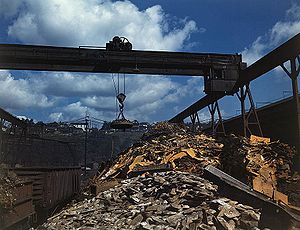|
|
Scrap metal originates just as frequently between businesses and homes as well. The proper disposal and recycling of scrap metal is typically done by a business or service. Typically a "scrapper" will advertise his services to conveniently remove scrap metal for people who don’t need it, or need to get rid of it.
Scrap is often taken to a wrecking yard (also known as a scrapyard, junkyard, or breaker’s yard), where it is processed for later melting into new products. A wrecking yard, depending on its location, may allow customers to browse their lot and purchase items before they are sent to the smelters although many scrap yards that deal in large quantities of scrap usually do not, often selling entire units such as engines or machinery by weight with no regard to their functional status. Customers are typically required to supply all of their own tools and labor to extract parts, and some scrapyards may first require waiving liability for personal injury before entering. Many scrapyards also sell bulk metals (stainless steel, etc.) by weight, often at prices substantially below the retail purchasing costs of similar pieces.
In contrast to wreckers, scrapyards typically sell everything by weight, rather than by item. To the scrapyard, the primary value of the scrap is what the smelter will give them for it, rather than the value of whatever shape the metal may be in. An auto wrecker, on the other hand, would price exactly the same scrap based on what the item does, regardless of what it weighs. Typically, if a wrecker cannot sell something above the value of the metal in it, they would then take it to the scrapyard and sell it by weight. Equipment containing parts of various metals can often be purchased at a price below that of either of the metals, due to saving the scrapyard the labor of separating the metals before shipping them to be recycled. As an example, a scrapyard in Arcata, California sells automobile engines for $0.25 per pound, while aluminum, of which the engine is mostly made, sells for $1.25 per pound. Scrap prices are reported in a handful of U.S. publications, including American Metal Market, based on confirmed sales

From Wikipedia, the free encyclopedia : Wholesale of waste and scrap


